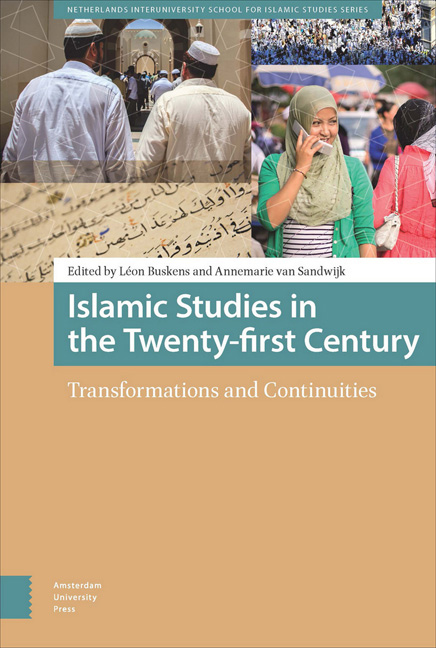Book contents
- Frontmatter
- Dedication
- Contents
- Preface
- Introduction: Dichotomies, Transformations, and Continuities in the Study of Islam
- Islamic Texts: The Anthropologist as Reader
- Textual Aspects of Religious Authority in Premodern Islam
- What to Do with Ritual Texts: Islamic Fiqh Texts and the Study of Islamic Ritual
- Textual Study of Gender
- Scholarship on Gender Politics in the Muslim World: Some Critical Reflections
- Power, Orthodoxy, and Salvation in Classical Islamic Theology
- Dialectical Theology in the Search for Modern Islam
- “Classical” Islamic Legal Theory as Ideology: Nasr Abu Zayd’s Study of al-Shafiʿi’s al-Risala
- Islamic Law in the Modern World: States, Laws, and Constitutions
- Vernacular Cosmopolitanism as an Ethical Disposition: Sufi Networks, Hospitality, and Translocal Inclusivity
- Middle Eastern Studies and Islam: Oscillations and Tensions in an Old Relationship
- Notes on Contributors
- Overview of NISIS Autumn Schools, 2010-2014
- Index
Islamic Texts: The Anthropologist as Reader
Published online by Cambridge University Press: 12 December 2020
- Frontmatter
- Dedication
- Contents
- Preface
- Introduction: Dichotomies, Transformations, and Continuities in the Study of Islam
- Islamic Texts: The Anthropologist as Reader
- Textual Aspects of Religious Authority in Premodern Islam
- What to Do with Ritual Texts: Islamic Fiqh Texts and the Study of Islamic Ritual
- Textual Study of Gender
- Scholarship on Gender Politics in the Muslim World: Some Critical Reflections
- Power, Orthodoxy, and Salvation in Classical Islamic Theology
- Dialectical Theology in the Search for Modern Islam
- “Classical” Islamic Legal Theory as Ideology: Nasr Abu Zayd’s Study of al-Shafiʿi’s al-Risala
- Islamic Law in the Modern World: States, Laws, and Constitutions
- Vernacular Cosmopolitanism as an Ethical Disposition: Sufi Networks, Hospitality, and Translocal Inclusivity
- Middle Eastern Studies and Islam: Oscillations and Tensions in an Old Relationship
- Notes on Contributors
- Overview of NISIS Autumn Schools, 2010-2014
- Index
Summary
In the new millennium, especially in the aftermath of 11 September 2001, intensified and continuing scrutiny has been brought to bear on movements that invoke the shariʿa in their calls for reform and for the establishment of Islamic states. Sensational cases and aberrant regimes, such as the Taliban of Afghanistan, also have reinforced simplistic Western perceptions and fears of the shariʿa as backward, arbitrary and cruel. At present in the West, in the estimation of Muslim philosopher Ramadan (2004, 31), “the idea of shariʿa calls up all the darkest images of Islam.”
In its basic meaning, the shariʿa refers to the divine design for the community of Muslims as set forth in the Qurʾan and as exemplified in the words and actions of the Prophet Muhammad. But the term refers as well to a corpus of humanly authored legal thought elaborated at the meeting points of divine revelation and prophetic practice example with human reason. This large body of literature, technically known as the fiqh, was created and studied across Muslim societies over the course of many centuries. In books that served as the centrepiece of classical madrasa instruction, the shariʿa includes not only the precise formats for the ritual life but also the detailed bases for a comprehensive moral and political economy, specifying the potential acts, rights and obligations of the individual Muslim subject. As a matter of faith, the sacred identity of the shariʿa placed emphasis on its perfection and unity, but its human receptions, the necessary efforts by generations of Muslim jurists to understand and adapt the revelation and the Prophet's example, inevitably entailed differences of analysis and opinion, and these eventually were manifested in a number of distinct schools of interpretation.
Understood to be divine in origin and human in interpretation, the shariʿa comprised a character both transcendent and immanent, a reality at once timeless and historical. Yet beyond these twin formal senses – as a revealed law and as a humanly created jurisprudence – its further range as a lived historical phenomenon may be indicated by colloquial usage. In a down-to-earth sense, dropping the definite article, shariʿa refers to litigation, to conducting a lawsuit before a judge. “You and me, shariʿa” is an age-old challenge to an adversary to take a matter to court.
- Type
- Chapter
- Information
- Islamic Studies in the Twenty-first CenturyTransformations and Continuities, pp. 29 - 46Publisher: Amsterdam University PressPrint publication year: 2017



